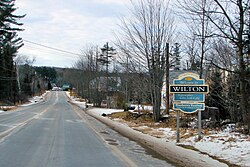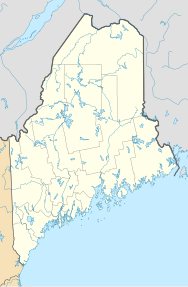Wilton, Maine
| Wilton, Maine | |
|---|---|
| Town | |
 |
|
| Motto: A great place to live, work & play | |
| Location within the state of Maine | |
| Coordinates: 44°36′59″N 70°14′37″W / 44.61639°N 70.24361°WCoordinates: 44°36′59″N 70°14′37″W / 44.61639°N 70.24361°W | |
| Country | United States |
| State | Maine |
| County | Franklin |
| Incorporated | 1803 |
| Area | |
| • Total | 42.82 sq mi (110.90 km2) |
| • Land | 41.26 sq mi (106.86 km2) |
| • Water | 1.56 sq mi (4.04 km2) |
| Elevation | 425 ft (130 m) |
| Population (2010) | |
| • Total | 4,116 |
| • Estimate (2012) | 4,076 |
| • Density | 99.8/sq mi (38.5/km2) |
| Time zone | Eastern (EST) (UTC-5) |
| • Summer (DST) | EDT (UTC-4) |
| ZIP code | 04294 (Wilton), 04234 (East Wilton), 04227 (Dryden) |
| Area code(s) | 207 |
| Website | www.wiltonmaine.org |
Wilton is a town in Franklin County, Maine, United States. The population was 4,116 at the 2010 census. Situated beside Wilson Pond, the former mill town is today primarily a recreation area.
The land replaced an invalidated 1727 grant by Massachusetts to veterans for service in the French and Indian Wars. The first grant (now part of Manchester, New Hampshire) was originally dubbed Harrytown after a particularly dangerous Native American, then renamed Tyngstown for Captain William Tyng, leader of the expedition of "snowshoe men" that killed him in 1703. Abraham Butterfield, a settler from Wilton, New Hampshire, paid the cost of incorporation in 1803 to have the new town named after his former residence.
Wilton is known for being the location of Maine's first cotton mill, started in 1810 by Solomon Adams. In 1876, George Henry Bass (1855–1925) founded G.H. Bass & Co. and became the best-known businessman in Wilton's history. Bass shoes (including those worn by Charles Lindbergh during his Atlantic crossing and Admiral Byrd in his expeditions to Antarctica) were made exclusively in Wilton for more than a century until 1998. By then the Bass family had sold out, and in 1998 Bass' parent company, Phillips-Van Heusen, moved operations overseas.
John Russell Bass (b. 1878), son of G. H. Bass, was treasurer for the firm and served as Maine delegate to the Republican national convention in 1920, 1944 and 1952. The company built much of its success on the Bass penny weejun, introduced in 1936 and said to be based on Norwegian fisherman's shoes. The style was an instant hit, and became a staple on college campuses across the nation. The shoe was later renamed the Leavitt penny weejun; it is no longer made in Wilton.
...
Wikipedia

